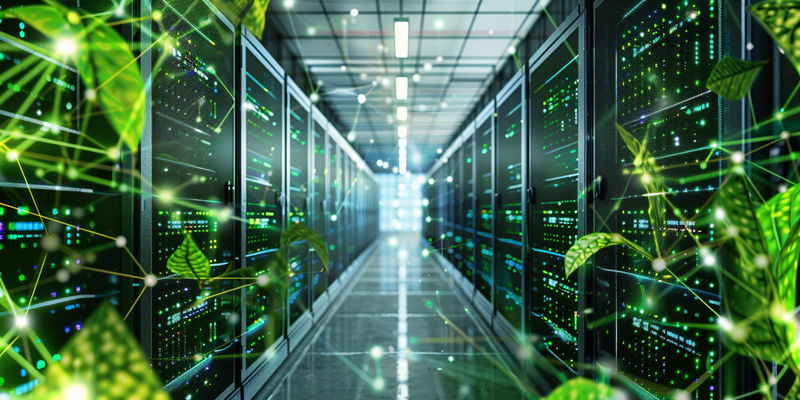Data centers are the pulsating engines behind our increasingly digital lifestyle, yet they cast a large environmental shadow with their hefty energy use and carbon emissions. As combating climate change becomes a global priority, the pressure is mounting for data centers to strive for net-zero energy. Integrating cutting-edge energy-efficient tech, tapping into renewable energy, and enhancing data management systems will be key to decreasing the ecological footprint and aligning with the world’s climate action efforts. Despite their critical role in modern society, data centers must continue to seek harmonious balance between technological growth and the protection of our natural environment.
The Pulse of the Digital World: Data Centers’ Growing Footprint
Beneath the surface of our online engagements lies the hefty power consumption of data centers, accounting for 1% to 3% of global electricity use. With predictions of this demand doubling in a mere half-decade, the environmental implications are staggering, and the push for sustainable practice becomes more urgent with every byte processed. The carbon emissions from data centers—an estimated 3.7% of the global total—highlight the need for a seismic shift in how they operate. As our dependency on digital infrastructure grows, so does the necessity for these data hubs to become stewards of a greener future.
Renewable Energy: A Pillar of Data Center Sustainability
Tech industry titans like Amazon, Microsoft, and Google are not just acknowledging the gravity of the situation; they’re setting net-zero benchmarks. By signing renewable energy purchase agreements, they showcase a willingness to lead by example. But net-zero is more than renewable power; it’s about a holistic approach to using resources effectively and responsibly across all aspects of data center operations. These companies have the influence and resources to be the change makers, from sourcing green energy to standardizing sustainable initiatives throughout the sector.
Measuring Sustainability: Beyond Energy Consumption
Sustainability metrics such as PUE, WUE, and CUE are how data centers gauge their eco-friendly progress, tracking everything from how energy is distributed to the impact on carbon and water footprints. Google’s revealing 2021 report underscored the need to focus on water consumption, shedding light on the 4.3 billion gallons used that year. Sharpening these metrics is crucial for enhancing the productivity of resources and lessening the operational burden on the environment, illustrating that every drop and watt counts.
India’s Pivotal Role in Sustainable Data Center Evolution
India is pioneering the green data center revolution with its commitment to source 50% of energy from renewables by 2030. This push positions India to potentially lead the sector globally, but aligning ever-growing data center demands with renewable energy capabilities presents distinct challenges. Nonetheless, India’s journey offers valuable insights for countries worldwide, balancing the pace of tech growth with the earth’s ecological limits.
A Strategic Roadmap to Net-Zero Data Centers
Achieving net-zero for data centers requires continuous innovation and the adaptation of energy-efficient practices. This roadmap is intricate, marrying renewable energy use with sustainable construction and tech adoption to fulfill the industry’s green promises. From the drawing board to the daily operations, sustainability has to be the guiding principle for each element of the data center lifecycle, striving for carbon-neutral existence.
Green Certifications and Waste Management: Indicators of Commitment
Eco-friendly badges of honor like LEED certification serve as a testament to a data center’s dedication to eco-conscious operations. Beyond helping the planet, waste management policies that focus on reducing and recycling material waste also play a pivotal role. These certifications and practices communicate a data center’s resolve towards a sustainable operation that is considerate of its environmental impact.
Social and Governance Aspects of Sustainability
The spectrum of sustainability stretches into the realm of social responsibility and governance. Upholding fair labor, participating in community welfare, and adhering to strict governance fortify the sustainable backbone of data center operations, ensuring that the technological advancements offered do not come at the expense of ethical and communal values.
The Imperative of Transparency and Accountability
Clear communication regarding sustainability goals and endeavors is vital. Data centers must openly share their strides and struggles towards net-zero, inviting scrutiny and a shared ownership of the sustainable path forward. Such candor is instrumental in cultivating collective accountability, necessary for the shift towards net-zero aspirations across the sector.
In summary, data centers are at a critical juncture, balancing the scales between digital innovation and the sustainability of our planet. A broad strategy that encompasses energy efficiency, renewable energy, sustainable design, accreditation, waste reduction, community engagement, governance, and transparent communication can steer the industry towards significantly reducing its carbon footprint. The goal of net-zero energy consumption aligns with the urgent global mission to mitigate environmental impact, ensuring that as we progress technologically, our ecological responsibilities are not left to the wayside.

